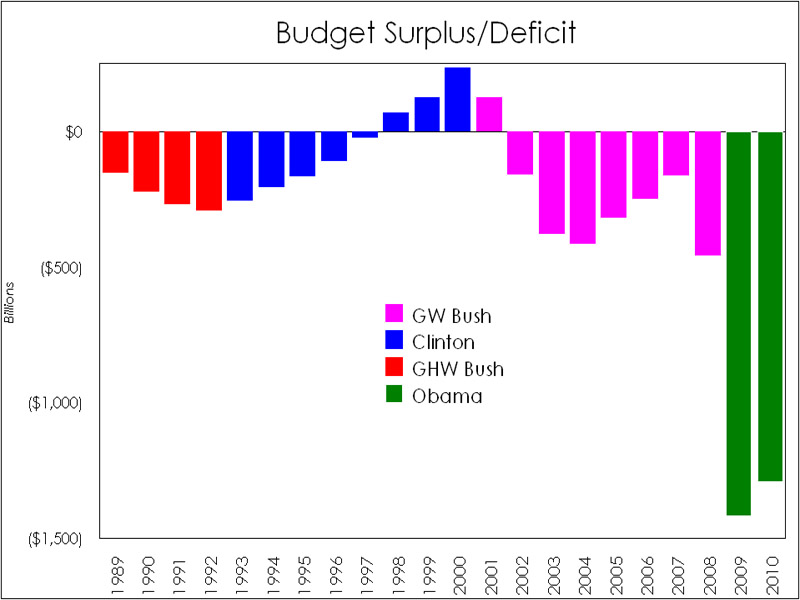When President Clinton took office the deficit was $290.4 billion.
When President Clinton left office the surplus was $236.4 billion.
WikiAnswers - How much surplus did the US have when Clinton left office
Clinton ran deficits throught all 8 years of his term, and one can go to the US Treasury Department and looking through the history of the total outstanding debt throught Clintons term. (
Debt to the Penny (Daily History Search Application))
Every year Clinton was in office, the total national debt continued to climb.
How Clinton managed to claim a surplus was that while the general operating budgets ran deficits but Clinton borrowed from numerous off budget funds to make the on budget fund a surplus.
For example, in 2000, Clinton claimed a $230B surplus, but Clinton borrowed
$152.3B from Social Security
$30.9B from Civil Service Retirement Fund
$18.5B from Federal Supplementary Medical insurance Trust Fund
$15.0B from Federal Hospital Insurance Trust Fund
$9.0B from the Federal Unemployment Trust Fund
$8.2B from Military Retirement Fund
$3.8B from Transportation Trust Funds
$1.8B from Employee Life Insurance & Retirement fund
$7.0B from others
Total borrowed from off budget funds $246.5B, meaning that his $230B surplus is actually a $16.5B deficit.
($246.5B borrowed - $230B claimed surplus = $16.5B actual deficit).
If there is ever a true surplus, then the national debt will go down.
http://www.treasurydirect.gov/NP/NPGateway
Date Debt Held by the Public Intragovernmental Holdings Total Public Debt Outstanding
01/04/1993 Not Available Not Available 4,167,872,986,583.67
01/05/1993 Not Available Not Available 4,169,232,407,244.75
01/06/1993 Not Available Not Available 4,171,132,340,862.78
01/07/1993 Not Available Not Available 4,177,129,381,121.13
12/26/2000 Not Available Not Available 5,661,579,846,114.32
12/27/2000 Not Available Not Available 5,663,706,592,936.09
12/28/2000 Not Available Not Available 5,665,928,609,714.47
12/29/2000 Not Available Not Available 5,662,216,013,697.37
01/02/2001 Not Available Not Available 5,728,739,508,558.96
01/03/2001 Not Available Not Available 5,723,237,439,563.59
01/04/2001 Not Available Not Available 5,719,452,925,490.54
01/05/2001 Not Available Not Available 5,722,338,254,319.31
01/09/2001 Not Available Not Available 5,725,066,298,944.04
01/10/2001 Not Available Not Available 5,724,315,917,828.49
01/11/2001 Not Available Not Available 5,734,110,648,665.41
01/12/2001 Not Available Not Available 5,735,197,779,458.19
01/16/2001 Not Available Not Available 5,711,790,291,567.40
01/17/2001 Not Available Not Available 5,718,517,343,351.92
01/18/2001 Not Available Not Available 5,725,695,166,475.90
01/19/2001 Not Available Not Available 5,727,776,738,304.64
Sorry but the surplus was on paper only.


